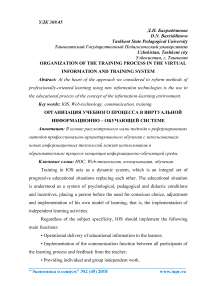Организация учебного процесса в виртуальной информационно - обучающей системе
Автор: Бариддинова Д.Н.
Журнал: Экономика и социум @ekonomika-socium
Статья в выпуске: 2 (45), 2018 года.
Бесплатный доступ
В основе рассмотренного нами подхода к реформированию методов профессионально-ориентированного обучения с использованием новых информационных технологий лежит использование в образовательном процессе концепции информационно-обучающей среды.
Иос, web-технология, коммуникация, обучения
Короткий адрес: https://sciup.org/140236115
IDR: 140236115
Текст научной статьи Организация учебного процесса в виртуальной информационно - обучающей системе
Training in IOS acts as a dynamic system, which is an integral set of progressive educational situations replacing each other. The educational situation is understood as a system of psychological, pedagogical and didactic conditions and incentives, placing a person before the need for conscious choice, adjustment and implementation of his own model of learning, that is, the implementation of independent learning activities.
Regardless of the subject specificity, IOS should implement the following main functions:
-
• Operational delivery of educational information to the learner;
-
• Implementation of the communication function between all participants of the learning process and feedback from the teacher;
-
• Providing individual and group independent work.
The mechanism of self-regulation of the learning process in the environment is based on direct and feedback in the "teacher-IOS-student" system. IOS is considered as a complex of components (blocks), which ensures the system integration of BAT into the learning process. Part of the ITS are students, teachers and "external" participants in the learning process, the interaction of which is carried out with the help of modern telecommunications. Information-knowledge flows (incoming, outgoing and intra-environment) are the most dynamic part that unites the various components of this system into a single whole. These links should be open, dialogical in nature and ensure the interaction of participants in the learning process between themselves and with the external environment [1].
The main condition determining the successful functioning of the entire system of educational activities in the ITS is the willingness of the participants in the learning process to interact in the new environment. A readiness means a number of psychological and pedagogical conditions that form the basis for the implementation of IOS to support the course being studied.
Despite the fact that the ITS is characterized by a high degree of control of the trainee in the course of training, in which the computer only creates an operating environment, training activities in such environments need more management from the teacher to uncover all the possibilities of the environment, since the new information will not become "knowledge" student until these fragments of information are integrated into the already existing body of personal knowledge. Such integration depends on the teacher who has access to the history of knowledge accumulation by the student and who is inclined to support them in implementing the necessary integration steps.
Effective independent learning activity on the development of a foreign language is possible only provided that timely feedback and control functions are provided. There is a type of feedback in the IOS. The first type is information that comes from one or another training or testing program included in the learning process in response to the student's actions. This feedback is characterized by speed, it gives the trainee an opportunity to make an informed conclusion about the success or failure of the learning activity. It encourages him to reflect, stimulates further action, helps evaluate and correct the results. The second type of feedback is the reaction of the teacher or other participants in the learning process to the activity of the trainee. It can be either operational or delayed, but only to some extent. In the context of telecommunication interaction, when non-verbal communication channels of participants in the learning process are overlapped, special attention should be paid to the timeliness of this communication, its constructive and positive attitude.
When organizing the project activity, an important task of the project managers from both sides is to provide operational feedback as a reaction to the outcome of the partners' activities. Systematically and rationally organized feedback in the performance of assignments in the IOS is extremely important, as it contributes to the formation of a stable positive motivation for students' learning activities.
When forming an independent educational activity in the ITS, it is necessary to pay attention to such factors as the emotional coloring of linguistic material, its significance, the degree of connection with the main activity, and the personal characteristics of the subjects. To achieve emotional coloration of learning, it is necessary to involve special groups of techniques that contribute to the development of positive emotional background for trainees, such as the alternation of various types of educational activity, as early as possible, the targeted integration of communication in the learning process, and the use of cognitive educational and authentic texts.
Used sources:
-
1. Карпов В.Е., Коньков К.А. Основы операционных систем – М.:
-
2. Сьюзел Д., Ротерей Д. Основные направления применения ЭВМ // Перспективы. Вопросы образования. - 1988. - № 3. - С.60-69
-
3. Collis, B. Pedagogical Re-Engineering: A Pedagogical Approach to Course Enrichment and Re-Design with the WWW//Educational Technology Review.
ИНТУИТ.ру, 2004. – 632 с.
"Экономика и социум" №2 (45) 2018
Список литературы Организация учебного процесса в виртуальной информационно - обучающей системе
- Карпов В.Е., Коньков К.А. Основы операционных систем -М.: ИНТУИТ.ру, 2004. -632 с.
- Сьюзел Д., Ротерей Д. Основные направления применения ЭВМ//Перспективы. Вопросы образования. -1988. -№ 3. -С.60-69
- Collis, B. Pedagogical Re-Engineering: A Pedagogical Approach to Course Enrichment and Re-Design with the WWW//Educational Technology Review.


